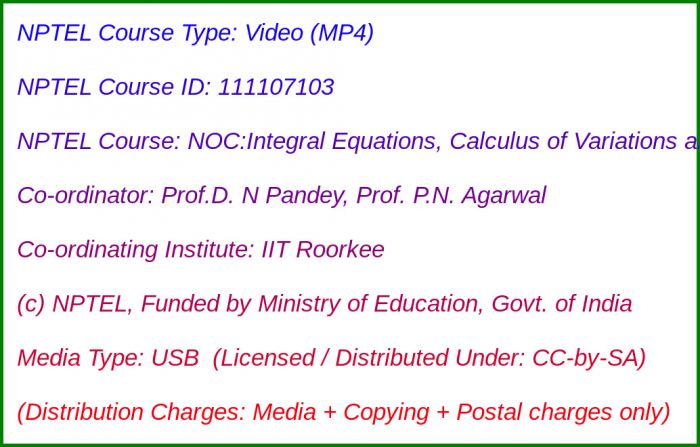NOC:Integral Equations, Calculus of Variations and Its Application (USB)

Media Storage Type : 32 GB USB Stick
NPTEL Subject Matter Expert : Prof.D. N Pandey, Prof. P.N. Agarwal
NPTEL Co-ordinating Institute : IIT Roorkee
NPTEL Lecture Count : 60
NPTEL Course Size : 17 GB
NPTEL PDF Text Transcription : Available and Included
NPTEL Subtitle Transcription : Available and Included (SRT)
Lecture Titles:
Lecture 1 - Definition and classification of linear integral equations
Lecture 2 - Conversion of IVP into integral equations
Lecture 3 - Conversion of BVP into an integral equations
Lecture 4 - Conversion of integral equations into differential equations
Lecture 5 - Integro-differential equations
Lecture 6 - Fredholm integral equation with separable kernel: Theory
Lecture 7 - Fredholm integral equation with separable kernel: Examples
Lecture 8 - Solution of integral equations by successive substitutions
Lecture 9 - Solution of integral equations by successive approximations
Lecture 10 - Solution of integral equations by successive approximations: Resolvent kernel
Lecture 11 - Fredholm integral equations with symmetric kernels: Properties of eigenvalues and eigenfunctions
Lecture 12 - Fredholm integral equations with symmetric kernels: Hilbert Schmidt theory
Lecture 13 - Fredholm integral equations with symmetric kernels: Examples
Lecture 14 - Construction of Green function - I
Lecture 15 - Construction of Green function - II
Lecture 16 - Green function for self adjoint linear differential equations
Lecture 17 - Green function for non-homogeneous boundary value problem
Lecture 18 - Fredholm alternative theorem - I
Lecture 19 - Fredholm alternative theorem - II
Lecture 20 - Fredholm method of solutions
Lecture 21 - Classical Fredholm theory: Fredholm first theorem - I
Lecture 22 - Classical Fredholm theory: Fredholm first theorem - II
Lecture 23 - Classical Fredholm theory: Fredholm second theorem and third theorem
Lecture 24 - Method of successive approximations
Lecture 25 - Neumann series and resolvent kernels - I
Lecture 26 - Neumann series and resolvent kernels - II
Lecture 27 - Equations with convolution type kernels - I
Lecture 28 - Equations with convolution type kernels - II
Lecture 29 - Singular integral equations - I
Lecture 30 - Singular integral equations - II
Lecture 31 - Cauchy type integral equations - I
Lecture 32 - Cauchy type integral equations - II
Lecture 33 - Cauchy type integral equations - III
Lecture 34 - Cauchy type integral equations - IV
Lecture 35 - Cauchy type integral equations - V
Lecture 36 - Solution of integral equations using Fourier transform
Lecture 37 - Solution of integral equations using Hilbert transform - I
Lecture 38 - Solution of integral equations using Hilbert transform - II
Lecture 39 - Calculus of variations: Introduction
Lecture 40 - Calculus of variations: Basic concepts - I
Lecture 41 - Calculus of variations: Basic concepts - II
Lecture 42 - Calculus of variations: Basic concepts and Euler equation
Lecture 43 - Euler equation: Some particular cases
Lecture 44 - Euler equation : A particular case and Geodesics
Lecture 45 - Brachistochrone problem and Euler equation - I
Lecture 46 - Euler's equation - II
Lecture 47 - Functions of several independent variables
Lecture 48 - Variational problems in parametric form
Lecture 49 - Variational problems of general type
Lecture 50 - Variational derivative and invariance of Euler's equation
Lecture 51 - Invariance of Euler's equation and isoperimetric problem - I
Lecture 52 - Isoperimetric problem - II
Lecture 53 - Variational problem involving a conditional extremum - I
Lecture 54 - Variational problem involving a conditional extremum - II
Lecture 55 - Variational problems with moving boundaries - I
Lecture 56 - Variational problems with moving boundaries - II
Lecture 57 - Variational problems with moving boundaries - III
Lecture 58 - Variational problems with moving boundaries; One sided variation
Lecture 59 - Variational problem with a movable boundary for a functional dependent on two functions
Lecture 60 - Hamilton's principle: Variational principle of least action

